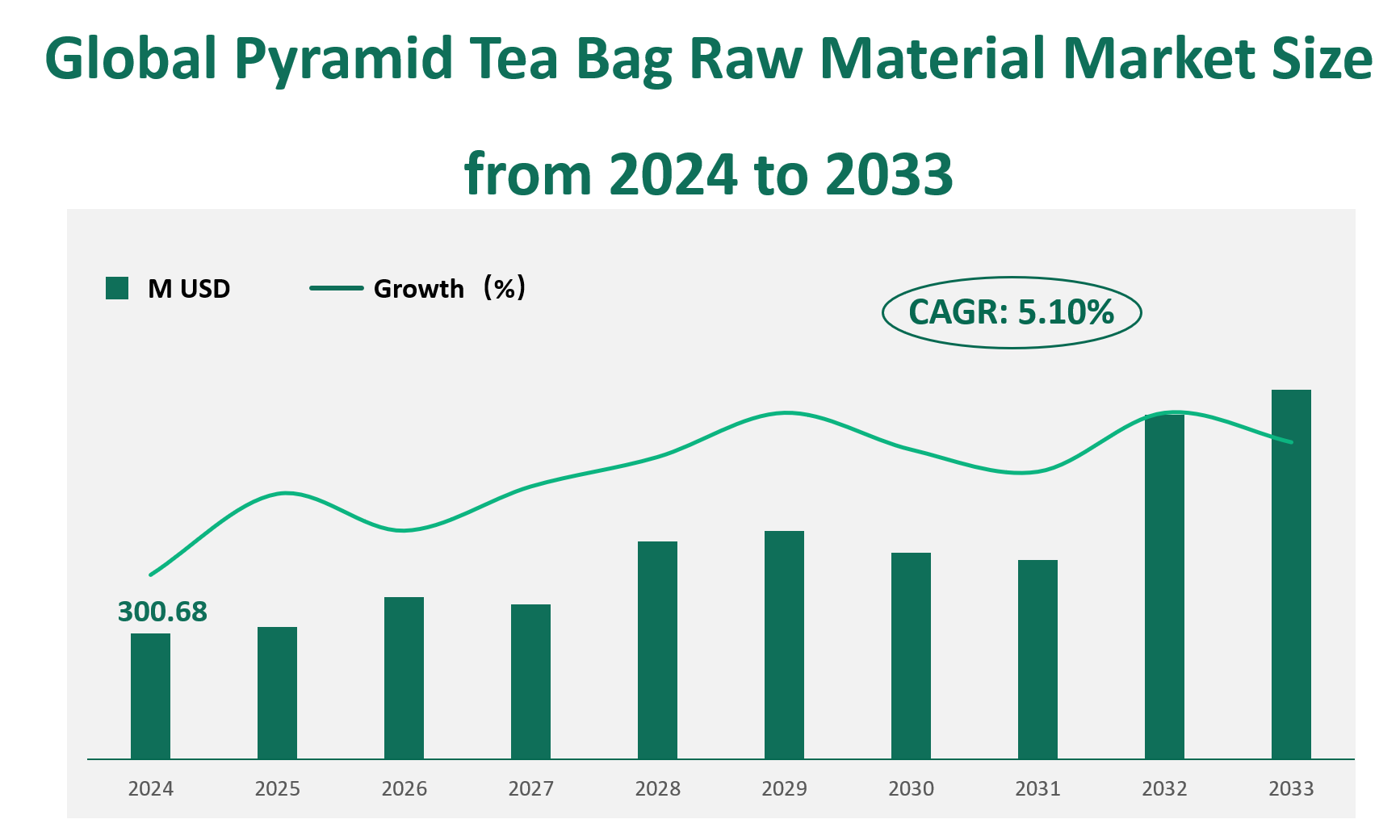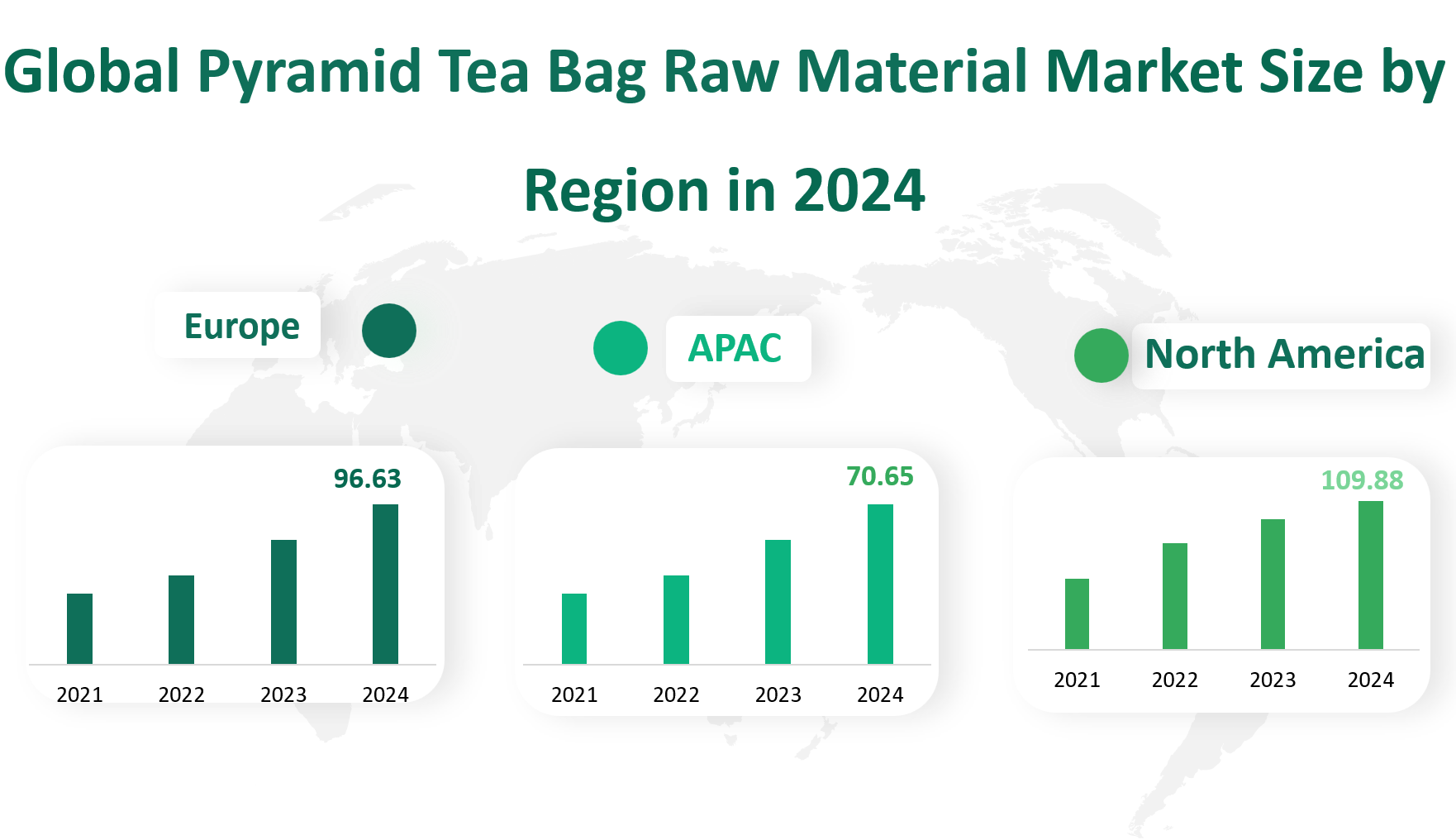1. Global Pyramid Tea Bag Raw Material Market Growth
The global Pyramid Tea Bag Raw Material market is a significant segment within the broader tea packaging industry, with a total revenue of 300.68 million USD in 2024. This market is projected to grow at a Compound Annual Growth Rate (CAGR) of 5.10% from 2024 to 2033.
Pyramid tea bags are a modern innovation in tea packaging, offering several advantages over traditional flat tea bags. These pyramid-shaped bags are designed to allow tea leaves more space to expand, enhancing the infusion process and delivering a richer flavor. The raw materials used in pyramid tea bags include a variety of fabrics and meshes, such as PET nonwoven, PLA nonwoven, PET mesh (woven), PLA mesh (woven), nylon mesh (woven), and other biodegradable materials. These materials are chosen for their durability, biodegradability, and ability to enhance the tea-drinking experience.
Figure Global Pyramid Tea Bag Raw Material Market Size (M USD) and CAGR (2024-2033)

2. Driving Factors and Limiting Factors of Pyramid Tea Bag Raw Material Market
The growth of the Pyramid Tea Bag Raw Material market is influenced by several driving factors. Firstly, the increasing global demand for tea, driven by its health benefits and convenience, is a key driver. Pyramid tea bags offer a superior infusion experience compared to traditional tea bags, allowing tea leaves to expand fully and release their flavors more effectively. This has led to a growing preference for pyramid tea bags among consumers, thereby boosting the demand for raw materials.
Another significant driver is the rising environmental consciousness among consumers. The use of biodegradable materials like PLA and PET nonwoven fabrics aligns with the global trend towards sustainable packaging solutions. Companies are increasingly focusing on developing eco-friendly products to meet consumer demands and regulatory requirements, which is expected to drive the market further.
However, the market also faces several limiting factors. One of the primary challenges is the fluctuation in raw material prices. The cost of polymers, which are essential for producing PET nonwoven fabrics, is closely linked to oil prices. Any volatility in oil prices can lead to significant fluctuations in raw material costs, impacting the profitability of manufacturers. Additionally, regulatory standards for bioplastics, such as the ASTM D6400 in the United States and EN13432 in Europe, add complexity to the production process and may limit market expansion.
3. Pyramid Tea Bag Raw Material Market Technology Innovation and Corporate Mergers and Acquisitions
The Pyramid Tea Bag Raw Material market has witnessed significant technological innovations and corporate activities in recent years. Companies are continuously investing in R&D to develop new materials and improve existing ones. For example, Ahlstrom-Munksjö has developed the BioWeb® and Fiber+ series, which are renewable and compostable tea bag materials made from polylactic acid (PLA). These innovations not only enhance the product’s functionality but also align with environmental sustainability goals.
Corporate mergers and acquisitions have also played a crucial role in shaping the market landscape. For instance, Glatfelter Corporation acquired Georgia-Pacific’s U.S. nonwovens business for $175 million, significantly expanding its manufacturing capabilities. Similarly, Total Corbion PLA, a joint venture between Total and Corbion, is set to become a global market leader in PLA with the construction of a 100,000-ton polylactic acid plant in France. These strategic moves are aimed at strengthening market positions and meeting the growing demand for sustainable materials.
Other companies, such as Yamanaka Industry Co., Ltd., are focusing on developing biodegradable filters like TEAROAD SOILON NW, which decompose naturally after use. This innovation highlights the industry’s commitment to reducing environmental impact while enhancing product quality.
4. Global Pyramid Tea Bag Raw Material Market by Types
Pyramid tea bags have revolutionized the tea industry by offering a superior infusion experience compared to traditional flat tea bags. This innovation has led to the development of various raw materials tailored to meet the demands of modern tea packaging. The primary product types in the Pyramid Tea Bag Raw Material market include PET Nonwoven, PLA Nonwoven, PET Mesh (Woven), PLA Mesh (Woven), Nylon Mesh (Woven), and Others.
PET Nonwoven is a fabric made from 100% polyester chips, formed through spunbonding and hot rolling techniques. This material is known for its durability and cost-effectiveness.
In 2024, the market revenue for PET Nonwoven reached $13.53 million. Its popularity stems from its ability to provide a strong and reliable structure for pyramid tea bags, ensuring that tea leaves can fully expand and release their flavors. However, PET Nonwoven is not biodegradable, which may limit its market share in environmentally conscious segments.
PLA Nonwoven is a biodegradable fabric made from polylactic acid, derived from plant starches such as corn, wheat, and cassava. This material is highly sustainable and eco-friendly, making it a preferred choice for environmentally conscious consumers.
In 2024, PLA Nonwoven generated a market revenue of $33.97 million. Its market share has been growing steadily due to increasing awareness of environmental issues and the push for sustainable packaging solutions.
PET Mesh (Woven) is a woven fabric with precise, uniform pores, allowing for optimal infusion of tea leaves. This material ensures that tea bags remain robust while allowing hot water to interact with the tea leaves efficiently. The market revenue for PET Mesh (Woven) in 2024 was $19.65 million.
PLA Mesh (Woven) is another biodegradable option, made from polylactic acid. This material combines the benefits of biodegradability with the functionality of a woven mesh. In 2024, PLA Mesh (Woven) achieved a market revenue of $72.89 million.
Nylon Mesh (Woven) is known for its strength and durability. This material is often used in applications where robustness is crucial. In 2024, the market revenue for Nylon Mesh (Woven) was $141.02 million. Despite its non-biodegradable nature, Nylon Mesh (Woven) remains a dominant player in the market due to its reliability and performance.
Table Global Pyramid Tea Bag Raw Material Market Size by Type in 2024
Type | Market Size (M USD) 2024 |
PET Nonwoven | 13.53 |
PLA Nonwoven | 33.97 |
PET Mesh (Woven) | 19.65 |
PLA Mesh (Woven) | 72.89 |
Nylon Mesh (Woven) | 141.02 |
Others | 19.62 |
5. Global Pyramid Tea Bag Raw Material Market by Applications
The Pyramid Tea Bag Raw Material market is segmented into two primary applications: Direct and Indirect. These applications refer to the sales channels through which the raw materials are distributed and utilized.
Direct application refers to the sale of raw materials directly from manufacturers to end-users, such as tea companies. This channel ensures that manufacturers have a clear understanding of consumer needs and can tailor their products accordingly. In 2024, the market revenue for Direct application was $190.22 million.
Indirect application involves the use of intermediaries such as wholesalers and retailers to distribute the raw materials. This channel provides broader market reach and can be more cost-effective for manufacturers. In 2024, the market revenue for Indirect application was $108.97 million. The indirect channel is particularly useful for expanding market coverage and reaching a wider range of customers.
Table Global Pyramid Tea Bag Raw Material Market Size by Application in 2024
Application | Market Size (M USD) 2024 |
Direct | 190.22 |
Indirect | 108.97 |
6. Global Pyramid Tea Bag Raw Material Market Size by Region
The Pyramid Tea Bag Raw Material market is a dynamic segment within the global tea packaging industry, with significant variations in revenue across different regions. In 2024, the market is projected to generate a total revenue of $300.68 million USD. This revenue is distributed across five major regions: North America, Europe, Asia-Pacific, Latin America, and the Middle East & Africa.
North America remains the largest regional market by revenue, with an estimated income of $109.88 million USD in 2024. This region’s dominance is attributed to its high consumption of tea products and the presence of major manufacturers. The United States, in particular, accounts for the majority of the regional revenue, driven by strong demand for high-quality, convenient tea packaging solutions.
Europe follows closely with a projected revenue of $96.63 million USD in 2024. The European market is driven by stringent environmental regulations and a growing consumer preference for sustainable packaging. The market is highly competitive, with companies focusing on innovation and the development of biodegradable and compostable tea bag materials to meet regulatory standards such as EN13432.
Asia-Pacific is the fastest-growing region in the Pyramid Tea Bag Raw Material market, with a projected revenue of $70.65 million USD in 2024. The growth in this region is fueled by rapid economic development, increasing disposable incomes, and a growing middle class that is more willing to spend on premium tea products.
Latin America and the Middle East & Africa are smaller but emerging markets, with projected revenues of $11.94 million USD and $10.09 million USD respectively in 2024.
Figure Global Pyramid Tea Bag Raw Material Market Share by Region in 2024

7. Global Pyramid Tea Bag Raw Material Market Analysis by Major Players
7.1 Ahlstrom-Munksjö
Company Introduction and Business Overview: Ahlstrom-Munksjö is a leading global provider of sustainable and innovative fiber-based solutions. Established in 1851, the company has a strong presence in Europe and operates worldwide. Ahlstrom-Munksjö is renowned for its commitment to sustainability and innovation, focusing on developing eco-friendly products that meet global environmental standards.
Products Offered: The company offers a range of tea bag materials, including BioWeb® and Fiber+ series, which are made from renewable biopolymers like polylactic acid (PLA). These materials are fully compostable and offer excellent infusion properties, making them ideal for pyramid tea bags.
Sales Revenue in 2021: Ahlstrom-Munksjö reported a revenue of $33.29 million USD in 2021, solidifying its position as a market leader.
7.2 Glatfelter
Company Introduction and Business Overview: Glatfelter is a global leader in the production of engineered materials. Established in 1864, the company is headquartered in the United States and operates worldwide. Glatfelter is known for its high-quality, innovative, and customizable solutions for tea and coffee filtration, personal hygiene, and packaging products.
Products Offered: Glatfelter’s DYNAGREEN® is a fully sustainable and renewable plant-based solution made from biodegradable fibers such as PLA. This product is EN 13432 certified and can be used in various packaging lines.
Sales Revenue in 2021: Glatfelter’s revenue in 2021 was $28.60 million USD, reflecting its strong market position and commitment to sustainability.
7.3 Yamanaka Industry Co., Ltd.
Company Introduction and Business Overview: Yamanaka Industry Co., Ltd. is a leading manufacturer of beverage filters, focusing on health and safety. Established in 1950, the company is based in Japan and operates worldwide. Yamanaka Industry Co., Ltd. is committed to producing high-quality filters that enhance the tea-drinking experience.
Products Offered: The company’s TEAROAD SOILON NW is a biodegradable filter made from polylactic acid, derived from plant starch. This product is designed to decompose naturally after use, making it an environmentally friendly choice for tea packaging.
Sales Revenue in 2021: Yamanaka Industry Co., Ltd. reported a revenue of $14.02 million USD in 2021, showcasing its strong market position and innovative product offerings.

